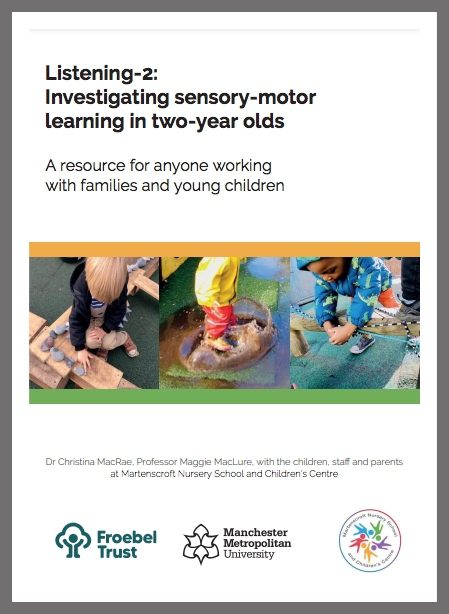This research uses Froebelian principles to deepen understanding of two-year-old children’s sensory-motor relationships with their environment.

Project summary
The Listening-2 project brings Froebelian philosophy into conversation with a materially informed pedagogy that is attentive to 2-year olds’ sensory and affective ways of knowing. At the heart of the project is an innovative slow-motion, video-based methodology that also invited parents and practitioners to be co-researchers, and where ‘listening’ was understood as an expanded attentiveness, not simply to words, but crucially, to movement, sound and gesture. Drawing on Froebelian principles, the project aims were to value parents’ knowledge of their own children, while also engaging with Froebel’s idea that there is something unique about the ways that young children engage with the world. It proposed that by tuning in to this, adults can learn both from and with the child. In particular, the project focused on the Froebelian concepts of unfolding, self-activity, and imitation.
Listening-2 built on well-established relationships within a nursery setting in a diverse, inner-city Children’s Centre in Manchester that provides government-funded nursery provision for 2-year-olds. We hope the focus on the significance of sensory and felt aspects of young children’s learning will contribute to national debates around parenting and school readiness, by foregrounding adults’ engagement with children in terms of attunement rather than deficit.
Watching slow-motion video data collectively with research participants produced a keener awareness of the dynamics of children’s bodies moving responsively in relation to matter and space; foregrounding small thresholds of change and perceptible micro-movements. Our video methodology allowed us to consider the more-than-human dimensions of events. We found connections here with Froebelian principles of unfolding and self-activity and how these are anchored in the everyday interactions of adults and children. As we watched video-clips repeatedly, we became aware of how vision also taps into other senses such as touch and proprioception (both in the children’s responses, but also offering a kinaesthetic receptiveness in ourselves as watchers). This idea is developed more fully in our paper Watching two-year olds jump: video method becomes ‘haptic’ (MacRae & MacLure, 2021), where the unfolding relationality at the heart of movement is highlighted; and where, as Froebel says, force and matter mutually condition each other.
The research elaborates the significance of Froebel’s concepts of unfolding and self-activity, as noted above, by identifying resonances with contemporary new materialist thinking and concepts of emergence, self-organisation, materiality and relations with the physical world. This allowed us to reconceptualise the significance of imitation as a vital element in children’s development. In our paper Folding Froebel with Deleuze: rethinking the significance of imitation in early childhood (Global Education Research, forthcoming), we explore an immanent line in Froebel’s thought, highlighting the immersive and self-transforming qualities of imitation events. This conceptualisation is distinct from Piaget, where imitation, is primarily given value as a cognitive stage of symbolic representation.
The project advocates for a relational pedagogy for the early years, in which the ‘asymmetries’ of power of power and knowledge that structure interactions between adults and young children are tempered by a Froebelian sensitivity to children’s distinctive modes of relating to the world, both human and physical.
Publications:
An article published by MMU in July 2022 focuses on the research project and understanding how children relate to the world through their bodies and senses.
Christina Mac Rae and Maggie MacLure, 2021, Watching two-year-olds jump: video method becomes ‘haptic’, Ethnography and Education, https://doi.org/10.1080/17457823.2021.1917439

